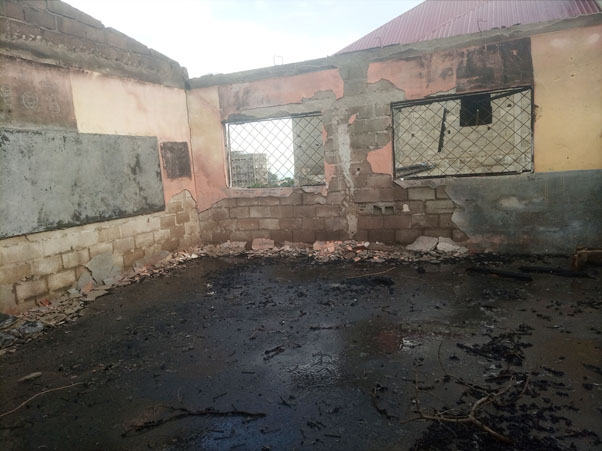In the Anglophone Regions of Cameroon, school-going children and their parents are caught in a catch-22 situation, where they most probably go against separatist fighters or government forces and administrators when they make a choice on which school to attend.
While separatists want locals to only attend their community-approved schools, and some confessional schools, government officers and forces want locals to only attend government schools.
In their various extreme positions, separatists have banned government schools, while government officers have banned community schools, which they say is a creation of separatists. Last year, government officers even included some confessional schools in their list of unauthorised schools, because they deem it as yielding to separatist dictates since separatists approve of confessional schools.
One, among the many setbacks of the ongoing Anglophone Crisis, has been campaigns against the right to education, which is an established human right, as stated in Article 26 of the December 1948 Universal Declaration of Human Rights, and Article 17(1) of the African Charter on Human and People’s Rights.
Year after year since the crisis started, actions taken by the various belligerents have always threatened children’s right to education. First, education was curtailed for thousands of children by separatist fighters, who issued education bans throughout the two Anglophone Regions. After national and international condemnations and pressure, the separatists decided to gradually give up on anti-school campaigns.
However, they have continued to insist that they will only allow private, confessional, and community schools to function, and will not allow government schools to operate. This has made it difficult, especially for poor parents who can only afford government schools, since they are relatively cheaper, with little paid as fees.
On her part, the government has issued strong warnings against any community schools, regarding them as a separatist creation, which cannot be allowed. In some cases, the government, since last year, has banned even some private and church-run schools, stating that learners must all enrol in government schools.
These two extreme points by the government and separatist fighters have left many in the middle, as any of the choices means going against one of the two belligerent forces. This, therefore, makes it difficult for parents to be at peace when sending their children to school because they know that in effect, they will be going against either government or separatist fighters and that the safety of their children will not be guaranteed.
In several instances, students and teachers have either been kidnapped, tortured, had some body parts mutilated, or even killed because of school activities.
This year, a non-state armed group operating in Kembong, Manyu, in Cameroon’s Southwest Region, attacked Catholic School Kembong on September 26. During the attack, they shot a priest and a teacher and abducted some community leaders.
On September 25, 2023, armed men suspected to be separatist fighters set ablaze Government High School Batibo. They reportedly burnt the government school as retaliation for the Senior Divisional Officer moving around and shutting down community schools, which had been authorised by the separatists to function.
Still this year, two primary school teachers, Fonjang Eric Denis, and Ndim John Budji, were, on September 2, 2023, killed after attending a meeting aimed at planning for the 2023/2024 school year. They were killed by an armed group in Belo, the administrative headquarters of Boyo Division, in the Northwest Region.
While separatist fighters attack and shut down government schools, the state insists that locals must enrol into government schools, even though they have not provided enough security to guarantee the safety of students and teachers who attend such schools, which are often targeted by separatists.
The attacks by separatist groups that have sometimes led to the killing of teachers violate Article 3 of the Universal Declaration of Human Rights. The article states that, “Everyone has the right to life, liberty and the security of person”.
The failure of the state to provide security to learners and teachers of government schools, which it approves and forces locals to attend, also violates Article 22 of the Universal Declaration of Human Rights.
This article dictates that, “Everyone, as a member of society, has the right to social security and is entitled to realization, through national effort and international co-operation and in accordance with the organization and resources of each State, of the economic, social and cultural rights indispensable for his dignity and the free development of his personality”.
The two parties, state forces and separatist fighters, through their extreme conditions for schools, make it difficult for parents and learners who reserve the right to choose which school to enrol in.
This violates Article 26(1) of the Universal Declaration of Human Rights, which states that, “Everyone has the right to education. Education shall be free, at least in the elementary and fundamental stages. Elementary education shall be compulsory. Technical and professional education shall be made generally available and higher education shall be equally accessible to all on the basis of merit”.
Concerning the issue of safety of learners and teachers, Northwest Governor, Adolphe Lele Lafrique, said special measures have been taken this year to ensure the safety of learners and teachers. Concerning separatists’ approval of community schools, the Governor instructed SDOs to clamp down on them.
In one of their outings, APLC, a group described as a council of separatist units fighting on the ground in Anglophone Regions, released a video about their anti-government schools' agenda.
“We have to embark on everything that will frustrate La République in Ambazonia, We don’t want La République schools in Ambazonia, and we shall not be taking orders from the La République government,” a self-styled separatist commander said in a video that was posted on the group’s Facebook page.
Rights activists have widely condemned the anti-school campaigns. They have been drumming for children’s right to education, and condemning the various killings and attacks on school actors. Rights promoters like Barrister Agbor Balla and others have expressed the need to keep education out of the ongoing crisis.

